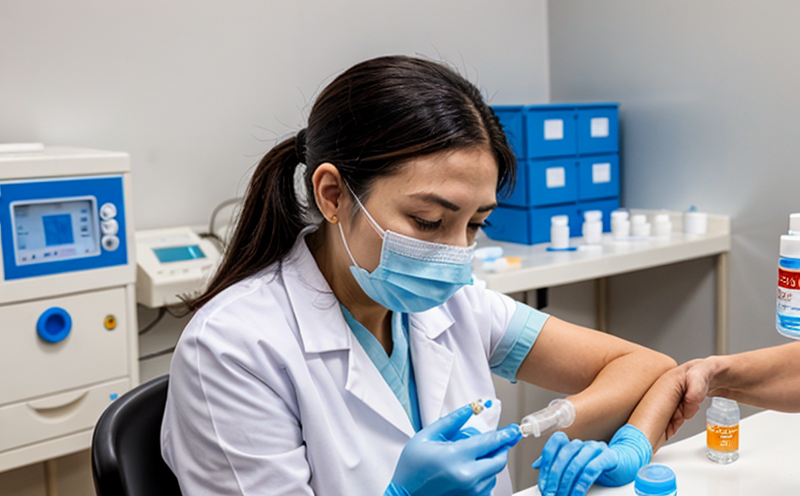WHO Potency Testing of Rotavirus Vaccine
The World Health Organization (WHO) potency testing is a critical step in ensuring the safety and efficacy of vaccines. This process involves rigorous evaluation to determine the concentration or amount of active ingredient present in each dose of the vaccine. For rotavirus vaccines, this test is essential for meeting regulatory requirements and ensuring that every batch meets the expected therapeutic standard.
The potency testing procedure typically follows established international standards such as WHO guidelines and ISO standards. The primary goal is to ensure consistent quality across all batches produced by different manufacturers or facilities. This ensures that healthcare providers can rely on these vaccines when immunizing children against rotavirus, a major cause of childhood diarrhea in many parts of the world.
The process begins with sample preparation where each batch undergoes detailed examination under controlled conditions. This includes dilution and incubation steps designed to bring the active ingredient into a form suitable for measurement. Following this step is the determination of the concentration using either bioassay or chemical methods depending on the specific requirements outlined by WHO.
Once determined, the potency value serves as proof that each batch meets the specified threshold set forth by global health authorities like WHO and FDA (Food and Drug Administration). This not only helps maintain product consistency but also builds consumer confidence in pharmaceutical products. By adhering strictly to these procedures, laboratories ensure they are contributing positively towards public health goals worldwide.
Rotavirus vaccines play a crucial role in preventing severe dehydration caused by rotavirus infections among infants and young children globally. Ensuring accurate potency testing is vital for maintaining the effectiveness of such vaccines across different regions. It supports healthcare systems' ability to provide effective immunization programs aimed at reducing child mortality rates due to diarrhea.
Given its importance, this service requires highly skilled personnel operating state-of-the-art equipment capable of delivering precise results consistently. The use of advanced analytical techniques ensures accurate measurements, which is paramount for meeting stringent regulatory requirements and maintaining public trust in pharmaceutical products.
In summary, WHO potency testing plays an integral part in ensuring the quality and safety of rotavirus vaccines. It provides assurance that each batch meets predefined standards set by international health organizations, thereby supporting global efforts to combat diseases like rotavirus effectively. This process underscores the commitment towards delivering reliable medical solutions globally.
Industry Applications
- Vaccine manufacturers following WHO guidelines for quality control and assurance.
- Regulatory bodies ensuring compliance with international standards.
- Healthcare providers seeking evidence of vaccine efficacy before implementation into routine immunization schedules.
- R&D teams working on improving current formulations or developing new rotavirus vaccines.
Quality and Reliability Assurance
The laboratory performing WHO potency testing adheres to strict quality management systems (QMS) based on ISO 17025 standards. These measures ensure that all tests are conducted under controlled conditions, using calibrated instruments, and by trained personnel following standardized procedures. The reliability of the results is further enhanced through internal audits, proficiency testing programs recognized by WHO, and continuous staff training.
Customer satisfaction is paramount for our laboratory services. To achieve this, we invest in cutting-edge technology and ongoing professional development to stay abreast of industry advancements. Our commitment extends beyond just providing accurate test results; it includes proactive communication with clients regarding their needs and expectations. By doing so, we ensure that every aspect of the testing process contributes positively towards achieving desired outcomes.
Our robust quality assurance framework also encompasses adherence to Good Laboratory Practice (GLP) principles which emphasize transparency, integrity, and objectivity in all laboratory activities. This approach not only enhances credibility but also fosters trust between stakeholders involved in vaccine development and distribution processes.
Environmental and Sustainability Contributions
In addition to delivering high-quality services that support public health initiatives globally, our laboratory actively contributes towards sustainability efforts within its operations. By adopting energy-efficient practices in our facilities and minimizing waste generation through proper disposal methods, we aim to reduce our ecological footprint.
We recognize the importance of responsible resource management and strive to implement policies that promote recycling and conservation wherever possible. Our commitment extends beyond operational efficiency; it also encompasses engagement with local communities around sustainable development goals aligned with WHO's mission to improve global health outcomes.
By integrating these principles into our daily operations, we contribute positively towards creating a healthier environment while supporting efforts aimed at eradicating diseases like rotavirus through effective vaccination programs worldwide.





